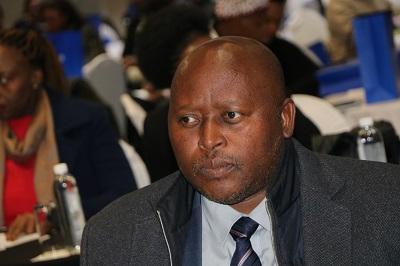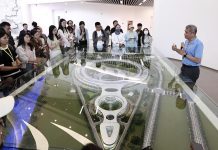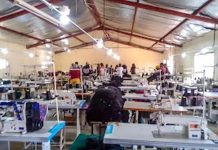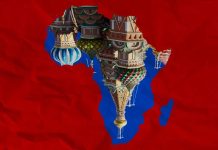Africa-Press – Lesotho. The recent imposition of the “reciprocal” tariffs by the United States (US) President Donald Trump has thrown Lesotho into uncertainty.
The US has imposed 50% tariffs on Lesotho’s products entering the US markets.
This news was received with disappointment by not only the government and business but also by factory workers whose jobs are threatened.
In 2000 Lesotho began to export a variety of textiles to the US markets through the African Growth and Opportunity Act (AGOA) and many factories were established with products destined for the US.
Many of the local factories produce textiles, footwear, leather products and clothes, with some that producing car seats cover and electronic products.
The factories are among the largest employers in the country and they have numerous economic offshoots from the small micro-medium enterprises (SMMEs), blocks of rental units, estates, public transport, and freight companies are among main businesses that directly benefit from the presence of the factories.The uncertainty over AGOA’s renewal which expires in September later this year and the recent announcement of the 50% tariffs have placed many jobs and businesses on the edge.
Minister of Trade, Industry and Business Development, Hon Mokhethi Shelile, said there are 11 factories which are exporting to the US market employing about 12 000 Basotho.
According to Competitiveness and Financial Inclusion (CAFI) reports, women and girls make up 83% of the factory workforce, which totals over 34,000 jobs, while men account for just 17%.
Zooming in on the country’s economic outlook, the World Bank reports that “Lesotho’s economy grew by an estimated 2.3 % in 2024, up from 1.8 % in 2023. This increase is explained by construction activities, particularly the Lesotho Highlands Water Project – Phase II (LHWP-II), the Lesotho Lowlands Water Development Project – Phase II (LLDWP-II), and other government capital investment, such as roads.
These projects generated positive spillover effects in the local services industry, further supporting economic growth.
“By contrast, export-oriented sectors like textiles, clothing, and mining underperformed due to weaker foreign demand and lower commodity prices. However, the labour market remains weak, and high unemployment and poverty levels persist.”
The government preparing to hold talks and negotiate lower tariffs with the US government. Shelile last week told the parliament that Lesotho will send the delegation to the US to negotiate the AGOA’s renewal on May 12.
The Minister of Trade stated that as Lesotho operates under the Southern African Customs Union (SACU) rules, it imposes 7.5% tariffs on US goods not the 99% referred to by the US.
He said the country is exploring other alternatives to export its products.
Lesotho benefits from the European Union (EU) Economic Partnership Agreement (EPA) along with the regional bloc it is part of, the Southern African Development Community (SADC) enjoy the preferential market access to the EU.
With the threat hanging over the 12 000 jobs, many livelihoods, especially youth and women who contribute the majority of the factory workers, remain on the economic edge unless some intervention is made to reverse the uncertainty.
For every factory job lost, there’s a ripple effect that touches the vendor selling food and fruits outside the gate of the factory, the taxi that ferries workers to and from work, the landlord relying on monthly rent from their tenants, and even freight companies transporting shipments to the South African ports.
Meanwhile, the Minister of Finance and Development Planning, Dr Retšelisitsoe Matlanyane allayed worries saying there should not be panic over these developments.
During a press conference last week, it was announced that the government has already engaged the factory owners and investors to assure them of jobs security amid the cloud of uncertainty hanging over many heads.
It was also announced that the Ministers of Trade, Finance, Foreign Affairs and Labour will take to the US to negotiate to convince the US government to reconsider the tariffs imposed on Lesotho. These ministers also had an audience with the US Embassy where they were given guidance on what Lesotho may do to remedy the situation.
Countries such as Vietnam and Zimbabwe have resolved to impose zero tariffs on US imports, a move meant to appease the US.
The government also told journalists that Lesotho began the negotiation of AGOA renewal in 2023 and continues to attend several forums and meetings where discussions centre around its renewal.
The government also reported that the tariff is in two parts where the first part is 10% which is the baseline and the second part is 40%. The former will be effective on April 5 while the latter is set to kick in on May 9. It was further stated during the press conference that it seems to be clear that the US government wants the trade deficit to decrease from what it currently is. As it is, the 99% tariff is reportedly based on what Lesotho exports to America versus what the US exports to Lesotho.
The 99% is reportedly Lesotho’s products entering the US market, whereas the 1% are American products imported into Lesotho. The 99% had been divided by two on a discount basis which resulted in the actual tariff of 50%.
It was said the reason that Lesotho registers low US products is that the statistics of services are poorly captured.
An example was made that many users in Lesotho use American software such as Microsoft and government uses other systems from the US, however these are not statistically captured which makes Lesotho’s consumption of American products seem low and this issue was raised during the meeting with the US Embassy.
The government said it had recognised that it cannot solely rely on the US market and it has got to diversify and exploit other markets. The government has also reported that out of 10 of the recently opened and expanded factories, only one exports to America.
Lesotho is reportedly seeking new markets.
The ministers showed that it imports 30% to neighbouring South Africa the decision is made to consider importing 80% within the SACU market. The government further expressed its intention to diversify its portfolio and preparations are under way to strengthen the market relations with the EU and the African Continental Free Trade Agreement (AfCFTA).
Meanwhile, there are fears that South African’s AGOA contract might not be renewed owing to strained relations between that country and the US. LNDC is reportedly lobbying the South African major retailers such as PEP Stores to consider Lesotho’s products and Lesotho is currently processing school uniforms ordered by the PEP Stores.
Foreign Affairs Minister Hon Lejone Mpotjoane said the US order is not exclusive to Lesotho only highlighting that the reason that Lesotho’s tariffs are high is due to the trade deficit. Lesotho reportedly exports around US$240 million (about M4.6 billion) annually to America while America only imports US$3 million (approximately M58 million) from Lesotho.
It is anticipated that by the conclusion of the Competitiveness and Financial Inclusion (CAFI) Project, there will be 50 factories that will benefit from enhanced skills and improved vertical integration with the aim of fostering a sustainable industry. This project seeks to safeguard existing employment and curb further job losses.
As a government-led initiative, the CAFI Project has partnered with the Lesotho National Development Corporation (LNDC) to support the realisation of these goals.
In June 2024, CAFI reported that there are 42 operational firms in Lesotho, with 14 originating from South Africa, 16 from Taiwan, six owned by Basotho, and another six by Chinese nationals.
These call for concern as the closure of foreign-owned factories would leave Lesotho with only six locally owned facilities.
Reacting to the US tariffs, the Chinese Embassy Spokesperson said in a statement on Sunday night assured that: “China always upholds true multilateral, promotes universally beneficial and inclusive economic globalization and is committed to building an open world economy. China will not impose trade barriers and firmly oppose unilateralism and trade protection
“We have given all the least developed countries with which we have diplomatic relations zero-tarrif treatments for 100 percent tariff lines since 1 December, 2024. Looking ahead, China will continue to enhance communication and coordination with Lesotho to defend the mutual interests of our two countries no matter how the international landscape may evolve.”
For More News And Analysis About Lesotho Follow Africa-Press






